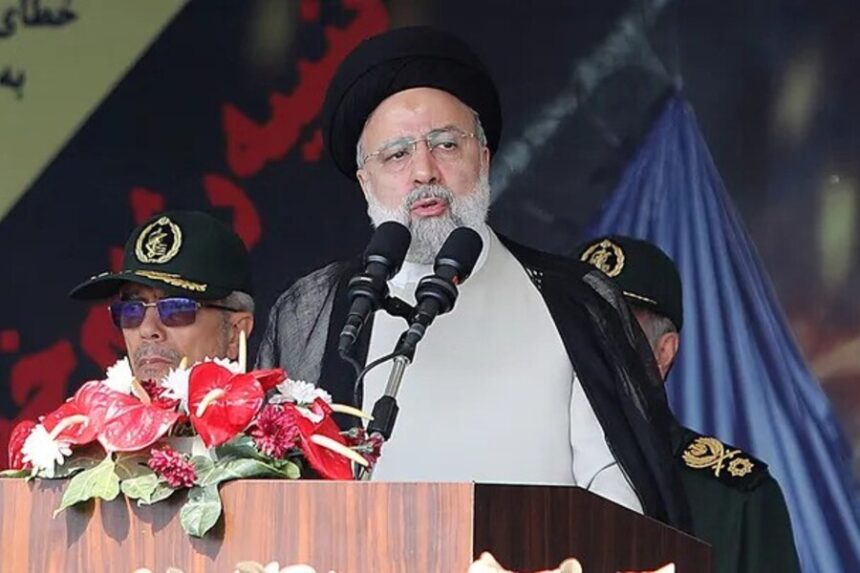In an escalating war of words and military posturing, Iranian President Ebrahim Raisi has threatened to annihilate Israel if it attempts any invasion, however minimal, against Iran. This stark warning came during his speech at an annual military parade last Wednesday, amid rising tensions following Iran’s barrage of missile and drone attacks on Israel over the previous weekend.
The recent surge in hostilities can be traced back to an incident on April 1st, when an attack targeted the Iranian embassy compound in Damascus, Syria, killing 12 people, including two high-ranking Iranian military generals.
Iran has openly accused Israel of orchestrating this attack, although Israeli officials have maintained ambiguity, neither confirming nor denying their involvement. This event significantly heightened tensions and set the stage for Iran’s response.
On the following Saturday, in a calculated retaliatory move, Iran launched a substantial assault involving hundreds of missiles and drones aimed at Israeli territory. This aggressive action prompted a swift and robust defense response from Israel.
Utilizing their advanced Iron Dome and David’s Sling missile defense systems, Israel, with the collaborative efforts of military allies including the U.S., the U.K., France, and Jordan, successfully intercepted approximately 99% of the incoming threats.
This near-perfect defense efficacy underscored the high stakes and technological prowess embedded in modern geopolitical conflicts, while simultaneously escalating the regional tensions to a near-boiling point. The situation has drawn international concern, as it not only destabilizes the region but also poses significant risks of sparking a broader conflict.
During the annual military parade, a significant departure from tradition was observed as the event was relocated to a military barracks north of Tehran, and unusually, it was not broadcast live on state television.
This change was likely a security measure to avoid the vulnerabilities of previous parade locations and to maintain strategic secrecy amidst growing tensions. At this gathering, President Ebrahim Raisi delivered a stark warning, intensifying the rhetoric against Israel. He declared that a more substantial Iranian attack could lead to the destruction of the “Zionist regime,” referring to Israel.
This warning, as reported by the IRNA news agency, was not just a defensive stance but a clear threat indicating Iran’s preparedness to escalate its military response if provoked further.
President Raisi’s remarks highlighted the extreme fragility of the current peace, which is delicately upheld by a thin veil of military restraint and ongoing diplomatic negotiations. His words served as a grim reminder of the potential for this regional conflict to devolve into a far more devastating war.
The global community watches closely, as the implications of such a conflict would extend well beyond the borders of the Middle East, challenging international peace and security. The strategic moves and counter-moves in this high-stakes geopolitical chess game continue to unfold, with each side gauging the other’s patience and thresholds for engagement.
The international community has expressed significant concern over the recent developments between Iran and Israel. In a strong and unified response, the United States, together with 47 other nations, issued a formal condemnation of Iran’s aggressive actions, labeling them as both “dangerous and destabilizing.”
This collective reproach underscores the broad disapproval of Iran’s tactics, which not only involve direct military assaults but also the use of airspace over several sovereign nations without permission, compounding the threat to regional stability.
Further compounding tensions was Iran’s controversial seizure of a Portuguese-flagged commercial vessel navigating through the Strait of Hormuz, a critical maritime chokepoint. This act of aggression has been vehemently criticized by the international coalition, citing it as a clear violation of international norms and maritime laws designed to ensure safe and free navigation in international waters.
Such actions have not only escalated the situation with Israel but have also raised alarms globally about the risk of open conflict, which could involve many nations due to the strategic importance and economic implications tied to the Strait of Hormuz.
These condemnations serve as a crucial reminder of the delicate balance of international relations in the region and the potential consequences of any nation’s unilateral aggressive actions that can lead to broader military and economic fallout. The global stance is aimed at preventing further escalation and encouraging a return to diplomatic negotiations to resolve the tensions peacefully. The situation remains fluid, and the international community’s role in mediating and possibly averting further conflict is more critical than ever.
The United Nations has also been actively involved, with the head of the UN agency for Palestinian refugees criticizing Israel’s operational constraints in Gaza and the West Bank.
Philippe Lazzarini, the Commissioner-General of UNRWA, reported to the Security Council that Israel’s restrictions had hindered humanitarian efforts, leading to dire consequences for the population, including a looming famine in northern Gaza.
In response to the attacks, Israeli Prime Minister Benjamin Netanyahu indicated that Israel would decide the nature and timing of its response cautiously, mindful of the diplomatic pressures to restrain from escalating the conflict further. “Israel retains the right to defend itself against foreign hostility and will not hesitate to do so when required,” Netanyahu stated in a press conference. Israel’s military council has been in session to strategize possible responses, emphasizing the severity with which Israel views the threat from Iran.
This incident is the latest in the long-standing shadow war between Israel and Iran, which has simmered for decades. Iran’s support of Hamas and Islamic Jihad—militant groups that oppose Israeli interests—has been a constant aggravation for Israel.
The October 7 terror attack by these groups, which killed 1,200 Israelis, was supported by Iran and triggered a severe Israeli offensive in Gaza that has had devastating humanitarian impacts.
Amidst these tensions, international efforts to mediate peace have been pivotal. Qatar, often playing the intermediary, alongside the U.S. and Egypt, facilitated a temporary ceasefire in November that saw the release of several hostages.
However, the Qatari Prime Minister Sheikh Mohammed bin Abdurrahman Al Thani has expressed concerns over the abuse of these mediations for political gains by some parties involved, hinting at underlying complexities in negotiation efforts.
As the region stands on the brink of potential large-scale conflict, the international community’s role in de-escalating tensions and promoting dialogue has never been more critical. The repercussions of a full-scale war could be catastrophic, extending far beyond the immediate regional stakeholders.
The coming days are crucial, as the world watches closely how these tense interactions between Iran and Israel unfold, hoping for a peaceful resolution but preparing for possible further escalations.
The unfolding situation between Israel and Iran is a poignant reminder of the longstanding geopolitical tensions in the Middle East, exacerbated by recent events.
With both nations standing firm on their defensive stances and retaliatory capabilities, the international community must intervene strategically to avert a crisis that could destabilize the region extensively. The specter of war looms large, but it is the diplomatic engagements at various levels that may yet hold the key to a sense of sustainable peace in the region.




